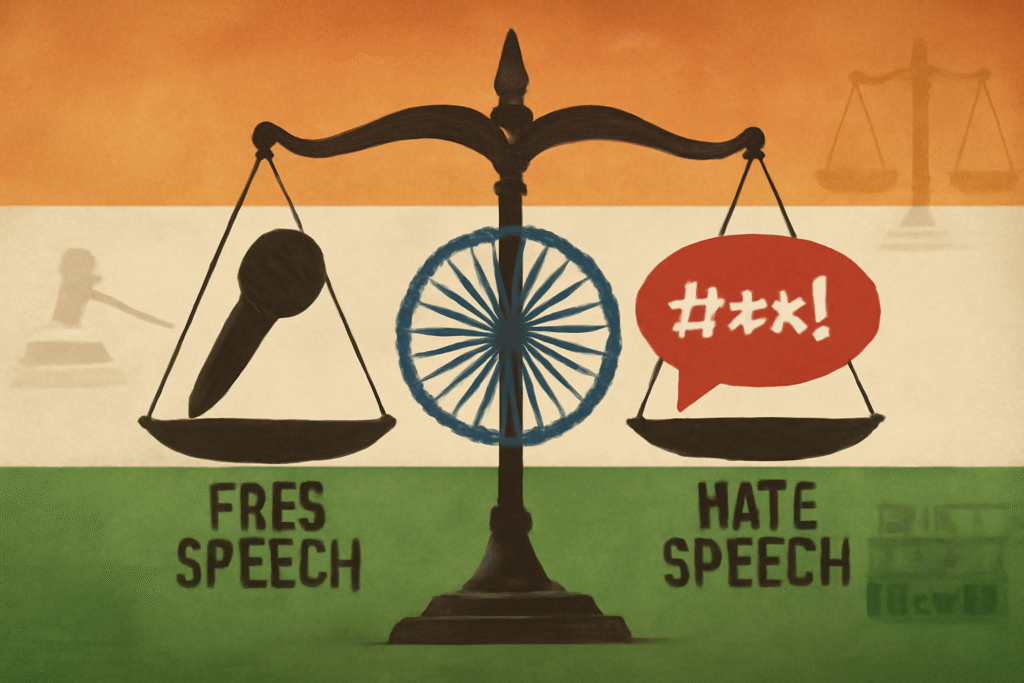Published On: November 17th 2025
Authored By: Safia Shahnawaz
Faculty of Law, Aligarh Muslim University
Court : Supreme Court of India
Bench : Dr. D Y Chandrachud, A. S. Bopanna, J. B. Pardiwala, J.J.
Date : 29th September, 2022
Relevant statues : Medical termination of Pregnancy Act, 1971, Medical termination of Pregnancy Rule, 2003, Article 21 Constitution of India,
Facts :
The case was filed by the Indian citizen permanent resident of Manipur residing in Delhi. Her parents are agriculturist and had five other siblings. During her stay in Delhi where she had a consensual relation and soon was carrying intrauterine pregnancy of gestational period of twenty two weeks and her partner refused to marry. This was then her decision to abort her child and was not ready to carry out child since she was being wary of being a single mother face the social stigma based on being single mother and all the harassment. Overall she had no means of livelihood to provide better quality living to the child and the mental trauma that will be carried would lead her a life of misery and suffering to both the baby and mother. Thus she opt for going for termination of Pregnancy where she sought permission to terminate her pregnancy in terms of Section 3(2)(b) of the Medical Termination of Pregnancy Act 1971 and Rule 3B(c) of the Medical Termination of Pregnancy Rules 2003 (as amended on 12 October
2021). The Appellant instituted a Criminal Miscellaneous Application for grant of interim relief to terminate her pregnancy during the pendency of the Writ Petition. By its order, High Court observed that Section 3(2)(b) of the MTP Act was inapplicable to the facts of the present case since the Appellant, being an unmarried woman, whose pregnancy arose out of a consensual relationship, was not covered by any of the Sub-clauses of Rule 3B of the MTP Rules. The order of the High Court gave rise to the present appeal. Based on the filed SLP the petitioner demanded to permit the ongoing pregnancy to terminate, to restrain the respondent from taking any criminal proceedings against her.
Issues :
- Whether interpretation of legislation must be guided by the text and context of a statute as well as the object it seeks to achieve?
- Whether Modern legislations ought to be read in view of the evolution of society from the time of enactment ?
- Whether the term “change of marital status” in Rule 3B(c) ought to be interpreted as “change in the status of a relationship” to include unmarried or single women as well as women who are not divorced but are separated or have been deserted ?
- Whether women in Live-in relationships if entitled value equivalent to that of Marital Relationship then why Medical Termination rules create distinction on status of women ?
- Weather Women cannot enjoy the right to bodily integrity and autonomy, as well as reproductive rights ?
Arguments :
Petitioner Arguments :
Dr Amit Mishra was the Ld counsel for Petitioner who argued before the court on the pretext of violation of Human Right as well as of Constitutional right under Article 14 where Unmarried females are excluded from Medical Termination of Pregnancy Rules, 2003. In India, termination of pregnancies is to be done strictly in terms of the MTP Act. The preamble of the MTP Act states that it is an Act to provide for the termination of certain pregnancies by registered medical practitioners and for matters connected therewith or incidental thereto. The MTP Act specifies the requirements to be fulfilled for terminating a pregnancy, including the persons who are competent to perform the termination procedure, circumstances when abortion is permissible, and places where the procedure may be performed. Section 3 of MTP Act, 1971 provides the whole structure who can get termination done, place where it can be done or who can perform ie (RMP) registered Medical practitioner. The particular provision of section 3(2)(b) is in question which defines what constitutes later as bias and violation of body autonomy as the single medical practitioner will have to provide for an opinion to terminate the pregnancy that would in cases can have a scope of arbitration. The question was also raised regarding the time bonding which was to be done with time limits otherwise it would lead to Health issues involving the mother and child both. Despite the enactment of the MTP Act, a number of hurdles continue to prevent full access to safe and legal abortions, pushing women to avail of clandestine, unsafe abortions. These barriers include insufficient infrastructural facilities, a lack of awareness, social stigma, and failure to ensure confidential care. In some situations, unmarried women face particular barriers due to gender stereotypes about women’s sexual autonomy outside marriage. These barriers are a serious impediment and deter single women from seeking safe and legal abortions. Such barriers may contribute to a delay in accessing abortion services or a complete denial of such services, consequently negating women’s right to reproductive autonomy, including the restraints provided under the Statute.
Respondent’s Argument :
Ms Aishwarya Bhati solicitor general is the ld counsel for the respondent who contends the outcome of the legislation that are primarily outdated in some sense where the concept of modern legislation needs to be evolving. Women from every aspect is granted autonomy in the Sense which reflects her physical rights granted under the Constitution. A subordinate legislation should give effect to the statute it is enacted under, thus the Over the years, the Parliament has enacted legislation bringing about a congruence between the rights of married and unmarried women. The Maternity Benefit Act 1961 was enacted to provide maternity benefits to women employed in any establishment. The payment of maternity benefits is extended to all women (including unmarried women) by the use of the phrase every woman. Over the years law has enabled inclusion of women (unmarried, married) in ambits of The Hindu Succession Act 1956 was enacted to codify the law relating to intestate succession among Hindus. Section 6 of the Hindu Succession Act 1956 pertains to devolution of interest in coparcenary property. In terms of this provision a daughter, irrespective of her marital status, is a coparcener in her own right in the same manner as the son by virtue of the Hindu Succession (Amendment) Act 2005. Section 8 of the Hindu Adoptions and Maintenance Act 1956 stipulates that any female Hindu regardless of her marital status has the capacity to take a son or daughter in adoption. Sections 7 and 8 of the Guardian and Wards Act 1890 allows for persons to apply for an order of guardianship without making any distinction between men or women, married or unmarried.
Judgement :
The Honble Supreme Court went for Purposive Interpretation of the statute and focused on determining the actual validity of the the act and the exclusion of Unmarried Women keeps it in discriminatory terms. Raised by the alarm of cull through the practice of such act. In Principles of Statutory Interpretation by Justice G.P. Singh, it is stated that a statute must be read in its context when attempting to interpret its purpose. Context includes reading the statute as a whole, referring to the previous state of law, the general scope of the statute, surrounding circumstances and the mischief that it was intended to remedy. Before the amendment of the MTP Act of 1971 mainly emphasised on married women, however, the amendment made in 2021, eliminated the differences between unmarried and married women. It conceded that all women are granted the right to lawful and secure abortions. Rule 3B of MTP Rules, 2003 was repealed for amounting to discrimination in the case of unmarried women, who may encounter the same obstacles and situations as married women. In Surendra Chauhan v. State of Madhya Pradesh, a two-Judge Bench of this Court upheld the Madhya Pradesh High Court’s order to convict the Accused Under Section 314 read with Section 34 of the Indian Penal Code for causing a woman’s death by miscarriage. According to the facts of the case, the Accused was in an illicit relation with the deceased, an unmarried woman of twenty four years. The deceased woman had become pregnant as a result of this relationship.Both of them had approached the clinic of a so-called doctor (who was named as a co- Accused) to terminate the pregnancy of around 3 months (approximately 12 weeks). The purported doctor was neither an RMP nor was his clinic approved by the government, in terms of the requirements laid down in the MTP Act. During the procedure for the termination of pregnancy, the woman passed away. This case is illustrative of the dangers of unsafe abortions, undertaken due to the social stigma surrounding pregnancies among unmarried women. In Sidra Mehboob Shaikh v. State of Maharashtra, the High Court of Bombay permitted the Petitioner to undergo medical termination of her pregnancy on the ground that compelling her to continue with her unwanted pregnancy would be oppressive, and would likely cause a grave injury to her mental health. The Petitioner, a victim of domestic violence, had approached the court to allow her to undergo an abortion as she pleaded that she did not want to raise a child in the absence of financial and emotional support from her husband; and raising a child on her own would be burdensome. The High Court observed that mental state of a person is a continuum with good mental health being at one end and diagnosable mental illness at the opposite end. Therefore, mental health and mental illness, although sound similar, are not the same.
Ratio decidendi
The court gave reasoning citing KS Puttaswamy v. Union of India where Right to privacy under Article 21 of the Constitution and also discussed Zakiya Luna’s 2020 publication where it was argued that reproduction is both biological and political. According to Luna, it is biological since physical bodies reproduce, and it is political since the decision on whether to reproduce or not is not solely a private matter. This decision is intimately linked to wider political, social, and economic structures. A woman’s role and status in family, and society generally, is often tied to childbearing and ensuring the continuation of successive generations. The MTP act recognises the reproductive autonomy of every pregnant woman to choose medical intervention to terminate her pregnancy. Implicitly, this right also extends to a right of the pregnant woman to access healthcare facilities to attain the highest standard of sexual and reproductive health. It is meaningless to speak of the latter in the absence of the former. Reproductive health implies that women should have access to safe, effective, and affordable methods of family planning and enabling them to undergo safe pregnancy, if they so choose. Court followed the reasoning based on what possible benefits can be obtained from inclusion of Pregnant women who is Unmarried as well and gave the Right to choose whether to give birth or not based on several mental, emotional and psychological factors.
Final decision :
The Supreme Court of India ruled that unmarried women also have the right to seek abortion up to 24 weeks of pregnancy under the MTP rules 2003 due to changes in circumstances. The Court held that a narrow interpretation of Rule 3B of the MTP Rules, which excluded unmarried women, was discriminatory and unconstitutional, as it violated Article 14 of the Constitution. The judgment affirmed that reproductive choices and autonomy apply equally to all women, regardless of marital status, in line with constitutional principles of equality and dignity.




